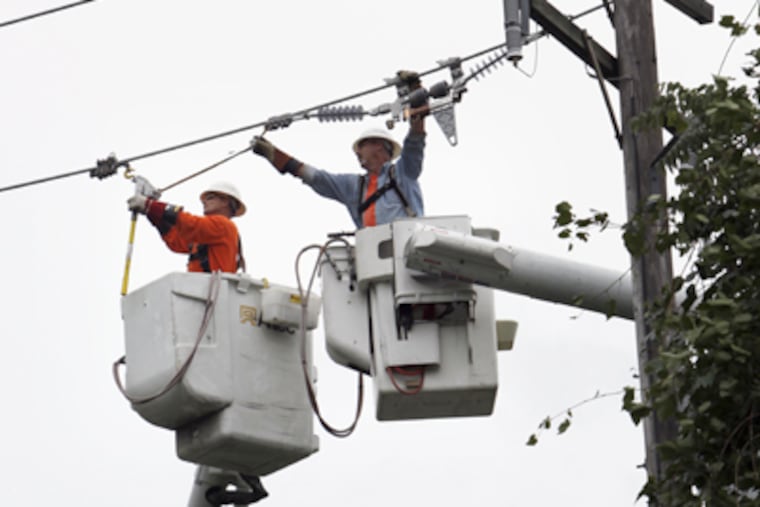Peco predicts a drop in electric-power price
Peco Energy Co. electric customers may be feeling a little deregulatory whiplash.

Peco Energy Co. electric customers may be feeling a little deregulatory whiplash.
Since market rates went into effect this year for the Philadelphia utility's 1.6 million customers, the price for residential electric power has gone up 12 percent. The biggest quarterly increase took effect Oct. 1 and will be reflected in bills that go out later this month.
But take heart, customers. Without fanfare, Peco last week posted its projected prices for Jan. 1, 2012, and it estimates residential rates will fall dramatically, back to the point where they started in 2011.
"This is good news," said Catherine Engel Menendez, Peco's spokeswoman.
The quarterly adjustments are a feature of electric deregulation that went into effect this year for Peco customers.
The major factors behind the rise and fall of rates are seasonal fluctuations in wholesale power prices that were invisible to customers under the old fixed-rate system. The variations became noticeable after rate caps came off and Peco's rates were adjusted every three months.
The price fluctuations are exaggerated in the current quarter - up 7 percent - because Peco is allowed to recover money it did not collect earlier this year when wholesale prices were higher than expected. The state requires utilities to reconcile under- or over-collections in the next quarter.
Peco's quarterly price swings add a wrinkle to the process of shopping for an alternative electric supplier.
Under Pennsylvania's Electric Choice Act, customers are free to shop for power suppliers, whose charges make up about two-thirds of the monthly bill. (Peco still collects a distribution fee from all customers for using its wires, regardless of who generates the electricity.)
Since rate caps were lifted, about 370,000 Peco customers have switched to alternative suppliers. Some suppliers are currently ramping up marketing campaigns to capture Peco customers, pointing out that their rates are substantially less than Peco's Oct. 1 rate of 11.14 cents per kilowatt-hour.
For instance, Constellation Energy Group Inc., a Maryland supplier, is currently offering a 12-month fixed price of 9.98 cents per kilowatt-hour, which it advertises is about 10 percent less than Peco's price.
But customers who opt for Constellation's fixed-rate contract could find they will be paying slightly more than Peco customers after Jan. 1, when Peco's rate is projected to drop to 9.91 cents per kilowatt-hour.
Peco's impending price decrease will create new challenges for suppliers as they set their prices for next year, said Jossi Fritz-Mauer, codirector of the Energy Cooperative of Pennsylvania, whose current rate is greater than Peco's projected price in January.
"The Energy Cooperative is still in the process of finalizing our prices for 2012, but this certainly presents a new dynamic for Peco customers looking to shop," said Fritz-Mauer.
Jennifer Kocher, the spokeswoman for the Pennsylvania Public Utility Commission, said that customers were becoming increasingly sophisticated as the markets mature and that more were switching in response to price changes.
She said the PUC advises customers contemplating a switch to compare prices at the commission's website.
"We would hope that anybody who is shopping would do their due diligence," she said.
Irwin "Sonny" Popowsky, Pennsylvania's consumer advocate, said the price fluctuations underscored the risks and rewards of locking into fixed-rate contracts when market rates are high or low.
"Some suppliers are able to beat Peco's rate, but perhaps not as much as they did a year ago," he said.
Indeed, Peco customers who locked in last December with suppliers offering 12-month fixed-rate deals of 8.89 cents per kilowatt-hour are currently paying 20 percent less than customers who stayed with the utility. For a customer using 500 kilowatt-hours a month, the monthly savings amount to about $11.20.
Not every Peco customer benefits by switching to an alternative supplier.
Alternative suppliers are still unable to beat the utility's discounted rates for about 160,000 residential heating customers and 80,000 customers with electric water heaters, said Engel Menendez.
But those below-market rates are scheduled to be eliminated at the end of 2012, and the utility expects suppliers to begin courting those customers at the end of next year.
Power shopping
EndText